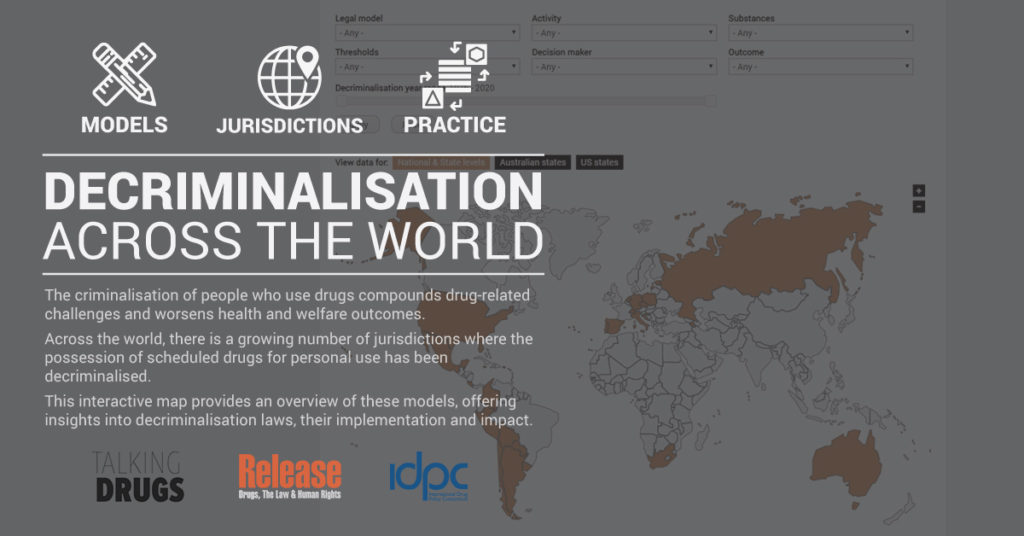 How can we end the war on drug users? Ask the jurisdictions worldwide that have decriminalised drug use!
How can we end the war on drug users? Ask the jurisdictions worldwide that have decriminalised drug use!
A new web-tool launched today shows that 49 countries and jurisdictions across the world have adopted some form of decriminalisation for drug use and possession for personal use. Experts say the number of jurisdictions turning to this policy option is likely to increase in the coming years.
‘Drug Decriminalisation Across the World’, an interactive map developed by Talking Drugs, Release and the International Drug Policy Consortium (IDPC), offers an overview of the different decriminalisation models – and their level of effectiveness – adopted all over the world.
Twenty-nine countries (or 49 jurisdictions) have adopted this approach in recognition that the criminalisation of people who use drugs is a failed policy, disproportionately targeting people living in poverty, people of colour and young people, and causing untold damage.
When effectively implemented, decriminalisation can contribute to improved health, social and economic outcomes for people who use drugs and their communities, as well as reduced criminal justice spending and recidivism. Further, there is no evidence that drug use increases under this model – or that it would decrease if criminalised. Decriminalisation is not a ‘soft’ policy option – it is the smart approach to reducing harms for individuals and society.
The major harms caused by the so-called ‘war on drugs’ have now been widely recognised: one in five people incarcerated for drug offences globally; more than half a million preventable deaths by overdose, HIV, hepatitis C and tuberculosis in 2016 alone; and severe human rights violations including arbitrary detentions, executions and extrajudicial killings. While this horrific situation is getting worse each year, the scale of the illicit drug market and prevalence of drug use continue to soar – at least according to the UN Office on Drugs and Crime’s latest global overview from 2019.
Niamh Eastwood, Executive Director of Release (the UK centre of expertise on drugs and drugs law), said: “What we really wanted to show here is the number and diversity of existing decriminalisation models adopted all over the world, and what the real impact is on the ground in terms of health, human rights, criminal justice and social justice outcomes”.
Ann Fordham, Executive Director of IDPC (a global network of non-government organisations that specialise in issues related to illegal drug production and use), said: “In Portugal, decriminalisation has significantly reduced health risks and harms. But that’s not the case everywhere. In Russia and Mexico, ill-designed models have exacerbated incarceration rates and social exclusion. When designing decriminalisation models, governments have to carefully review the evidence of what does and doesn’t work to ensure success”.
Imani Robinson, Editor of TalkingDrugs (online platforms dedicated to providing unique news and analysis on drug policy, harm reduction and related issues around the world), said: “The most useful element of this interactive map is that it highlights the impact of decriminalisation for communities on the ground. Many models enable the liberation of people who use drugs through a broad commitment to greater health and social gains overall and an emphasis on the provision of harm reduction education and services; others do not garner the same results. Smart drug policy is not decriminalisation by any means necessary, it is decriminalisation done right.”



